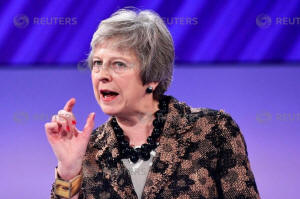|
With Brexit vote in doubt, UK firms get
ready for no deal
 Send a link to a friend
Send a link to a friend
 [November 20, 2018]
By Kate Holton and William Schomberg [November 20, 2018]
By Kate Holton and William Schomberg
LONDON (Reuters) - British companies began
triggering contingency plans to keep their businesses operating if
Britain leaves the European Union without a deal, underlining growing
concern that political wrangling in London could thwart an agreement
with Brussels.
With less than five months before Britain exits the EU, Prime Minister
Theresa May won the backing of many firms on Monday for a draft divorce
deal as she pursues a charm offensive to get Britain, deeply divided
over Brexit, on board.
The Bank of England also offered its support, saying the draft
withdrawal agreement would help to safeguard the economy and announcing
it would bring forward to Nov. 28 publication of bank stress tests to
give analysis of how to cope with a "no deal" Brexit.
This possibility has risen with opposition to May's deal uniting an
unlikely group of hardline Brexit campaigners in the Conservative Party,
May's Northern Irish allies in parliament and EU supporters.
With no obvious majority in parliament, May risks losing the vote on her
draft deal, most likely to be held next month. Such a defeat could open
the possibility of Britain leaving without a deal, or even of Brexit
being postponed or not happening at all.
Northern Ireland's Democratic Unionist Party, which props up May's
minority government, showed its hand late on Monday when it did not vote
with the government on the finance bill.
Its Brexit spokesman Sammy Wilson described this as "a political
message".

"We had to do something to show our displeasure," he said.
Wilson later told Sky News his party would vote against May's deal if it
came to parliament, but in the meantime DUP lawmakers would press the
government to change strategy on Brexit, Britain's biggest shift in
policy for almost half a century.
The prime minister may have hoped opposition to what is a draft divorce
deal with the EU would fade after an attempt to unseat her by Brexit
campaigners in her party seemed to be fizzling out.
She could still be hoping some in the main opposition Labour Party will
back her draft deal.
But also on Monday those who want her to keep the closest possible ties
with the EU in both her Conservatives and the Labour Party forced her
government into another embarrassing climbdown by promising to publish
an economic impact assessment comparing her deal with staying in the
bloc.
STARK CHOICE
May has warned lawmakers they have a simple choice: back her deal or
risk ushering in a no deal departure or delay to Brexit.
But few of her critics are accepting those terms.
Doubts over the vote in parliament have pushed companies to start making
plans for a "no deal" Brexit, which some have described as the
worst-case scenario that offers no confidence in supply lines and
trading conditions.
[to top of second column]
|

Britain's Prime Minister Theresa May replies to questions after
speaking at the Confederation of British Industry's (CBI) annual
conference in London, Britain, November 19, 2018. REUTERS/Toby
Melville

Electrocomponents <ECM.L>, which stocks more than half a million
industrial and electronics products, said it would spend 30 million
pounds ($39 million) to increase its holding of fast-moving lines in
Britain and Europe. AO World <AO.L>, an online electricals and white
goods group, said it might increase stock to mitigate any friction
in the supply chain while Compass <CPG.L>, the world's biggest
catering firm, said it was looking to build inventory and vary its
menus before Brexit next March.
However, Bank of England Governor Mark Carney told a parliamentary
committee that most businesses do not have contingency plans.
The BoE said it would fulfil a request from parliament's Treasury
Committee to provide analysis of how the draft Brexit divorce deal
"will affect the Bank's ability to deliver its statutory remits for
monetary and financial stability, including in a 'no deal, no
transition' scenario".
More than two years after Britons voted by 52-48 percent to leave
the EU, it is still unclear how, on what terms or even if it will
leave as planned on March 29, 2019.
The EU is due to hold a summit to discuss the draft deal on Nov. 25.
Some eurosceptic ministers in May's cabinet want her to rewrite
parts of it, though EU governments have largely ruled this out.
Justice Secretary David Gauke said talks were now moving on to
Britain's future relationship with the EU.
"The withdrawal agreement is essentially done. We have had thousands
of hours of negotiations with the European Commission and we have
reached a deal where there have been compromises on both side," he
told BBC radio.

"The withdrawal agreement meets our key objectives in terms of the
integrity of the United Kingdom which is so important to all of us
in government, especially the prime minister."
(Writing by Guy Faulconbridge and Elizabeth Piper; Additional
reporting by Helen Reid in London; editing by David Stamp)
[© 2018 Thomson Reuters. All rights
reserved.]
Copyright 2018 Reuters. All rights reserved. This material may not be published,
broadcast, rewritten or redistributed.
Thompson Reuters is solely responsible for this content. |